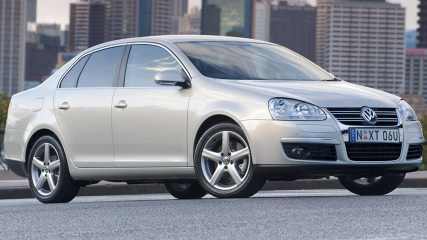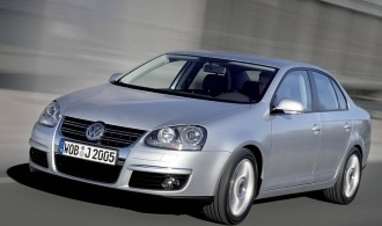Used Volkswagen Golf and Jetta review: 2005-2012
By Ewan Kennedy · 10 Aug 2012
Volkswagen Golf, a solid and sensible German car, is a major player in the European car market and in the last decade has made its mark in Australia as well.Those who need a practical car, but who enjoy driving will find the Golf goes a long way towards meeting each of these conflicting needs. Golf is a pleasant car to drive with good handing and sharp steering feel to let you get involved in what the car is doing, and with plenty of road grip even when pushed hard.These cars remain comfortable even on rough bush roads, though they are more at home in the suburbs than the far outback. These days Golf is a medium-sized car, having grown in size over the years, mainly to provide the extra space needed for occupant crash protection.There's some more interior room as well. In Europe, Golf is often seen as a full-sized car and it’s not unusual to see them carting four large adults about.Aussies tend to regard them more as transport for a family with preteen children, but if you live in an inner city area in Melbourne of Sydney you may need nothing more than a Volkswagen Golf to fill all your motoring needs.Golf is sold as a three- or five-door door hatchback. A ‘Golf’ four-door sedan was called the Bora from 1999 until the launch of the fifth generation model in 2005, when it was renamed Jetta. Boot space is substantially better than in the hatches and the four-door models are certainly worth consideration.VW Golf Cabriolet was sold until 2003. It has good roll-over protection for an open-top car and still offers a reasonable amount of space in the back seat. Access to the boot is difficult due to the odd location of the hinges. The Cabriolet was replaced by the New Beetle Cabriolet, but in a surprise move, VW reintroduced the Golf Cabriolet in 2012.Engines come in various guises: petrol and diesel; with four-, five- and six-cylinder units. Four-cylinder petrol engines are the most common, coming in capacities of 1.4, 1.6, 1.8 and 2.0 litres. The 1.6 will suit most drivers, but those who like to drive hard may find it a bit dull. The 1.4-litre is a brilliant, relatively recent, design and the little turbo unit provides performance with economy.Volkswagen in Australia started a big push in the diesel field several years ago and these engines are now far more common than in the past. With capacities of 1.6, 1.9 and 2.0 litres they provide plenty of grunt and turbo lag isn’t too bad.Those who enjoy a really good drive should consider the VW Golf GTi. A fun machine for the keen driver, it’s rapidly becoming regarded as a classic in the Australian hot-hatch market.Then there's the Golf R range of extreme hotshots. These traditionally had a large V6 engine – 3.2 litres in a smallish car gives plenty of performance. These are tagged as Golf R32. The latest model, launched in 2011, takes a different tack, going for 2.0 litres and a high-pressure turbo. Disguising the smaller size of the engine is the change of name to simply Golf R.Six-speed manuals arrived with the fifth-generation Golfs in 2004 and are popular on the used scene. The DSG gearbox, also launched in 2004, is a self-shifting manual gearbox. It provides far better performance than the old-style four-speed automatics used until 2004.This VW is a relatively easy car to work on and spare parts are not overly expensive. The dealer network has expanded from a low point during the mid-1990s and nowadays we hear very few complaints about parts availability or servicing.Insurance charges are about average for an imported European vehicle on most Golf and Jetta models. The high-performance Golf GTi may attract higher premiums, the Golf R32 and Golf R almost certainly will.Interiors generally stand up well, but some older Golfs that have been kept in the open continuously may suffer from sun-dried dashboard tops. Feel and look for uneven tyre wear, particularly on the front wheels.Look for scrapes on the bottom edges of the front mudflaps, they will often drag on the ground if the car has been cornered hard. New mudflaps could be a suspicious sign. Engines should start quickly. Listen for untoward engine noises, especially when it’s cold.Look for smoke from the exhaust when the engine is driven hard, particularly on long uphill runs. Make sure a manual gearbox doesn’t crunch on fast downchanges.Check that dual-clutch transmissions are positive in their shifts and don't hesitate too much at very low speeds. Be sure the brakes pull the car up evenly. If ABS is fitted you should feel a pulsing through the pedal during hard stops.Rust isn’t common in Golfs and is more likely to be the result of bad crash repairs than vehicle design. If you do come across any have the car inspected professionally or pass it up for another one.If there’s a problem in a used car get it fixed before you buy it. Don’t fall for the sales persons’ trick of saying you can bring it back later and everything will be sorted out then. It can be a lot harder then...










